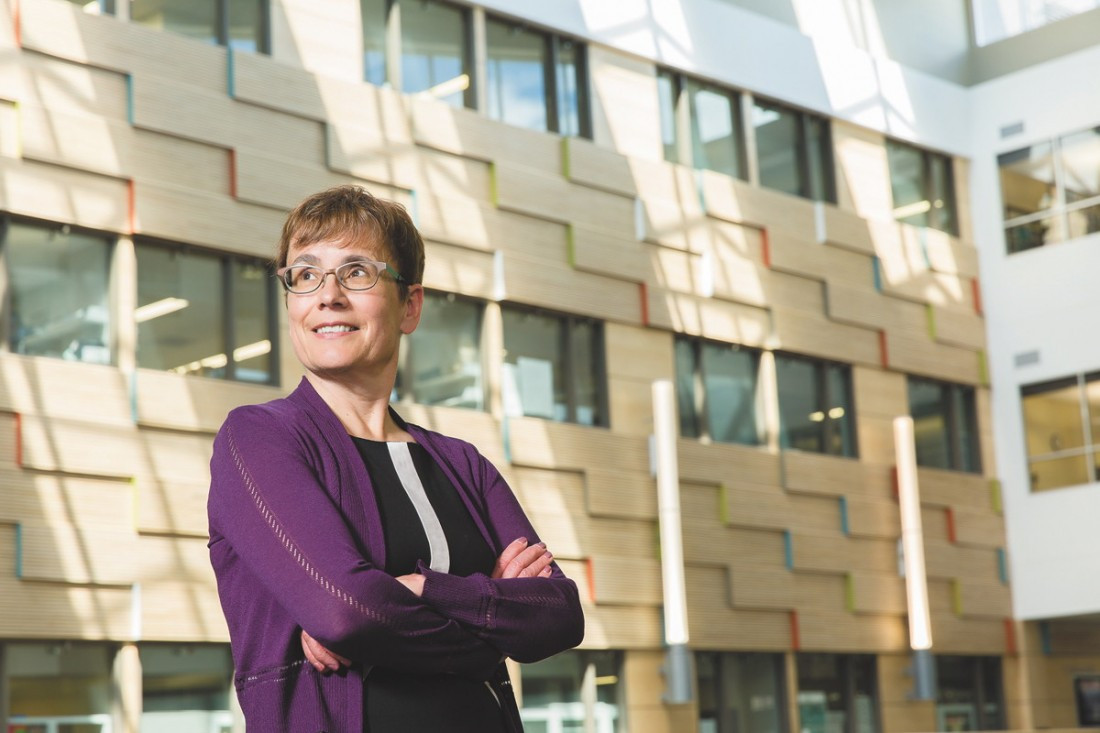Winnipeg Is: Embracing the Trimbee era
Looking ahead to Winnipeg, counselling and algae blooms
Dr. Annette Trimbee, U of W graduate and former Alberta Deputy Minister of Advanced Education, is now well in to her first year as U of W’s President and Vice-Chancellor. Many exciting things have happened under her watch including the recent $825,000 grant to develop the Graduate Studies program. Dr. Trimbee joined us over the phone to reflect on her year, current issues on campus and the future of the U of W.
Trimbee started off the year with a particularly bold and well-received inaugural speech, promoting openness and collaboration with other institutions, as well as an emphasis on attracting students from marginalized communities.
On what inspired her speech, Trimbee says she witnessed a lot of positive change in downtown Winnipeg when she would return for weddings. She hopes to fulfil “the commitments made by (Dr. Lloyd Axworthy) to really open up our doors and be more open and inclusive,” and to “attract new indigenous students, new immigrants and refugees” to the university.
Trimbee sees the university as playing an important role in growing Winnipeg’s core, pointing out that universities “bring a vibrancy and stability to cities, and open up a portal to far-away places.”
“We bring in a lot of energy and create a lot of optimism in Winnipeg’s downtown,” she says. “Universities and cities in Canada work well together, and we have many shared objectives.” However, she is careful not to overstate the U of W’s role, noting that the university should be “working with the city, rather than driving the city.”
Social justice has been one of Trimbee’s main emphases throughout the year, being something she addressed at length in her inaugural speech. Dr. Trimbee, who has recently begun connecting with her Métis roots, is a vocal advocate of increasing indigenous enrolment and involvement in the University.
She thinks that an indigenous course requirement is a “great idea,” and one that plays well into her goal of increasing indigenous faculty and course content on campus, as well as fostering a “warm, welcoming atmosphere” for indigenous students.
While Trimbee’s role is mainly administrative, she holds a Ph.D. in Ecology, and remains very passionate about the subject. She recently presented a lecture/conversation on algae blooms, an opportunity she thoroughly enjoyed.
“Preparing for (the lecture) was a lot of fun,” she says. “It gave me an opportunity to see how the state of the science has evolved since I was deeply involved in it. It also gave me the chance to challenge the conventional thinking a little bit, because sometimes when you’re away from something for a while, you come to see it in a whole new light.”
She also says her experiences in government allow her to bring a different view to the table than what is typically presented at similar lectures. “I understand how policy is developed, I understand how governments make decisions and I’ve had experience trying to incent people to act.”
Trimbee says opportunities like this lecture allow her to connect directly with students and researchers at the University, which she is grateful for. Dr. Trimbee traveled to Churchill with a group of geography students in August, and seeing those same students attend her lecture gives her “more reasons to get out and talk to students and faculty about what they’re doing.”
Speaking more on connecting with students, Trimbee made a point of commending student activists advocating for increased general counselling on their persistence and “compassion for their fellow students.”
On the issue of counselling, Trimbee said that she’s acutely aware of the unmet needs on campus. She points out that she has committed to strengthening in-house counselling at the university, but that we should remain open to partnering with the health system to bolster our services.
While she does not bring it up, it is noteworthy that Dr. Trimbee is University of Winnipeg’s third female president, and one of only seven female heads of Canadian universities at the moment. Despite the increased scrutiny often felt by female managers and administrators, she says she does not really notice the gender dynamic in her work.
“I started out in the Department of Environment, and at that time I was sort of the minority, so early on in my career I was quite aware of the gender imbalance, but as I rose to be Deputy Minister and I got more well-known in the community, it was on my mind less and less, so it’s not really something I thought of before I took the position as President,” she says.
“When I walk in to a room now and people know that I’m the president, I really feel that gender is not relevant,” she says. “However, when I do notice gender is because I’m returning back to (Winnipeg), I sometimes walk in to rooms where I know nobody, and they don’t know what position I hold, and then I sometimes feel like I have to be quite assertive to actually get in to the circle.”
Overall, Trimbee’s outlook on the future of the U of W is optimistic, but realistic. She knows what the problems are, and she will address them with foresight and calm positivity. She is pragmatic, but she doesn’t let that compromise her progressivism, a refreshing attitude given the neoliberal tide sweeping university administrations across the globe.
Most of all, she loves engaging with students, which she had the opportunity to do in attending last week’s Wesmen awards gala.
“It was phenomenal, it was a fun event… It was really great to learn about all of the other things that the Wesmen players do, from a community perspective,” she says. “(Going to an event like that) makes me very proud to be a part of the University of Winnipeg. It was very inspiring.”
Part of the series: The Urban Issue 2015
Published in Volume 69, Number 26 of The Uniter (March 25, 2015)








